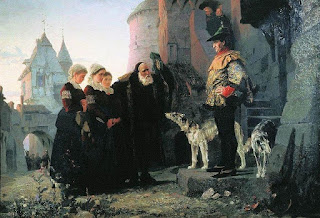 |
| This is a painting by Vasily Polenov that I found on Wikipedia. It represents a father bringing his daughter to his lord. Look at the posture of the lord... It looks like he is counting his sheep! |
If the household of ordinary people was a little more relaxed, being a matter of economy involved (work and feed the family), the nobles’ households were very strict regarding the women physical freedom. Maybe those restrictions were coming via church, were the men were in power over “weaker souls” that could be easier seduced by other men (that could have been husbands too) and fall into sin. Women were closely watched for any sign of “deviant” behavior. If caught, or even suspected, they risk their lives. Here is what
we read in A History of Private Life:
“The first duty of the head of household was to watch over, punish, and if necessary kill his wife, sister and daughters as well as the widows and orphans of his brothers, cousins and vassals.Since females were dangerous, patriarchal power over them was reinforced. They were kept under lock and key in the most isolated part of the house: the chamber des dames (the room of the ladies, my translation from french) was not a place for seduction or amusement but a kind of prison, in which women were incarcerated because men fear them” (A History of Private Life; II, Revelation of the Medieval World; George Duby; 1988, Harvard College; p.77).
But why were women so feared? Well, for once, they were the link to an alliance. Most of the time, men did not marry a woman because they loved her or got along very well. It was because of who her daddy was. The marriages were negotiated. The more powerful the dad, the more desired the daughter.
Then, men had to keep that alliance alive. Even in the event of the death of the wife, if the death occurred because of infidelity, then the man risked being disgraced by his father-in-law, not speaking about the shame that came with it.
Also, some women were feared because of what secrets they may have had, what
magical tricks they may have learned or for the seduction they could have pursued upon men.
And maybe some fears were legitimate because society devalued women, which, in return, were abused ...by men.
But unlike in medieval times, today, women have a better life (or do they?).




